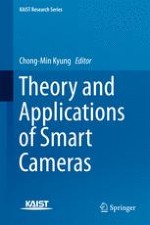2016 | OriginalPaper | Chapter
Distributed Medium Access for Camera Sensor Networks: Theory and Practice
Authors : Hojin Lee, Donggyu Yun, Yung Yi
Published in: Theory and Applications of Smart Cameras
Publisher: Springer Netherlands
Activate our intelligent search to find suitable subject content or patents.
Select sections of text to find matching patents with Artificial Intelligence. powered by
Select sections of text to find additional relevant content using AI-assisted search. powered by
